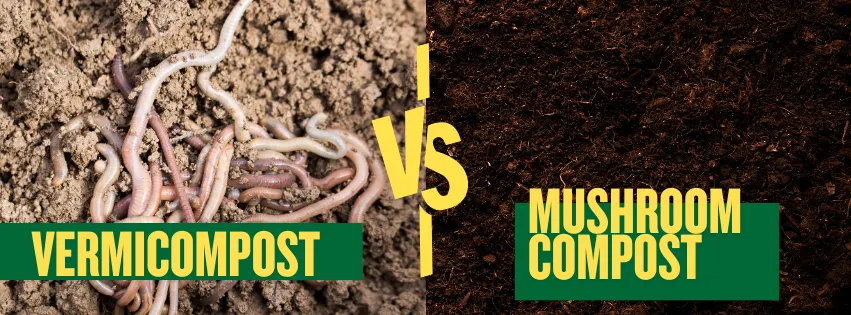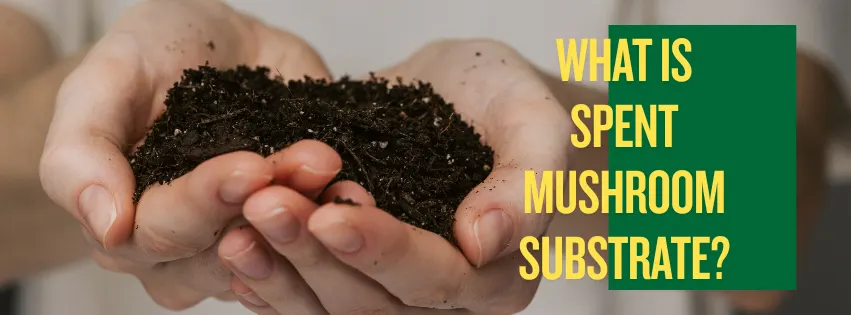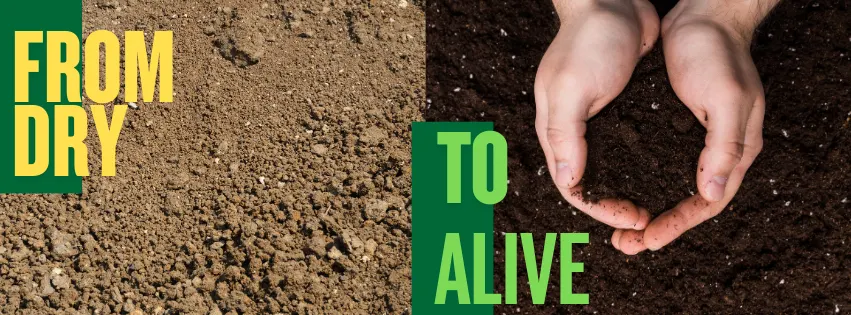
Choosing the Right Compost for Sustainable Farming
In farming and gardening, the type of compost you add to the soil directly impacts crop yield and soil health. Two widely used options are vermicompost, produced by earthworms, and mushroom compost (mushroom manure), the recycled material left after mushroom cultivation. While vermicompost is prized for its concentrated nutrients, mushroom compost is valued for improving soil structure and providing steady, long-term fertility. Understanding these compost for crops options helps farmers and gardeners decide which is most suitable for their fields, orchards, or kitchen gardens.
Vermicompost: The Nutrient Powerhouse
Vermicompost, also called worm compost, is made by red wigglers and other worms. They eat kitchen waste, crop residues, and farmyard manures, turning them into a fine, black, nutrient-rich compost.
Benefits of Vermicompost
Nutrient Richness: Contains nitrogen, phosphorus, potassium, and micronutrients in forms plants can easily absorb.
Soil Structure: Improves aeration and water-holding, especially in sandy soils.
Microbial Boost: Adds live beneficial microbes that support plant roots.
Pest Resistance: Worm compost reduces pest and disease pressure naturally.
Eco-Friendly: Recycles waste into a valuable soil amendment.
Best Uses of Vermicompost in Farming
Vegetables (tomato, chili, spinach, coriander): 1–2 tons/acre or 250–500 g per plant.
Seedlings & Nurseries: 20–30% of the potting mix.
Potted Plants: Mix with garden soil for long-term nutrition.
Cash Crops: Good for crops that need high nutrition quickly.
Mushroom Compost: The Soil Builder
Mushroom compost (mushroom manure) is the spent substrate left after mushroom farming. It is made from straw, poultry litter, gypsum, and other organics. Instead of going to waste, this material is recycled into a slow-release fertilizer for farms and gardens.
Benefits of Mushroom Compost
- Cost-Effective: Cheaper than vermicompost and available in bulk.
- Organic Matter Rich: Improves soil texture, porosity, and moisture retention.
- Balanced Nutrition: Supplies steady nutrients for crops over weeks.
- pH Buffering: Helps neutralize acidic soils — useful in parts of India.
- Flower & Fruit Friendly: Excellent for flowering plants, grapes, mangoes, and lawns.
Mushroom Compost Uses in Farming
Vegetables (brinjal, cabbage, tomato, chili): 2–3 tons/acre incorporated before planting.
Cereals (wheat, rice, maize): 1–2 tons/acre broadcast during land prep.
Fruit Trees (mango, guava, grapes, banana): 5–10 kg per tree twice yearly.
Pulses (lentils, beans, peas): 1.5–2 tons/acre as basal application.
Flowers & Lawns: Apply as a 1–2 cm top-dress layer.
Farmers often call it mushroom manure because it behaves like organic farmyard manure, enriching the soil steadily without burning crops.
| Aspect | Vermicompost | Mushroom Compost |
|---|---|---|
| Nutrient Content | High NPK & micronutrients, fast acting | Moderate, balanced, slow release |
| Soil Improvement | Best for aeration & microbial boost | Adds bulk organic matter, improves structure |
| Microbial Activity | Very high, rich in live microbes | Moderate, supports soil microbes indirectly |
| Best For | Vegetables, nurseries, high-value crops | Field crops, fruit orchards, lawns, flowers |
| Cost | Higher, limited bulk supply | Lower, bulk available in India & abroad |
Which Compost Should Farmers Use?
Choose vermicompost if:
✔ You grow vegetables, seedlings, or potted crops.
✔ You need fast-acting nutrients.
✔ You can invest in small but nutrient-rich doses.Choose mushroom compost if:
✔ You want bulk soil improvement at lower cost.
✔ You grow cereals, pulses, orchards, flowers, or lawns.
✔ You need to buffer soil pH and retain moisture.
The most sustainable strategy is combining both: use vermicompost for nurseries and vegetable beds, and mushroom compost for field crops and orchards.
Moving Forward with Compost Choices
Both vermicompost and mushroom compost are treasures for farmers. But their roles differ:
Vermicompost = nutrient booster
Mushroom compost = soil builder
For Indian farmers, mushroom compost is often the more cost-effective choice for large fields and orchards, while vermicompost shines in nurseries and vegetables. Together, they form a powerful duo for soil fertility and crop health.
As M.S. Swaminathan said: “The future of India lies in its soils. Keep them alive and they will keep us alive.”
Want to learn practical application rates and benefits in detail? Check our Mushroom Compost Complete Guide.


